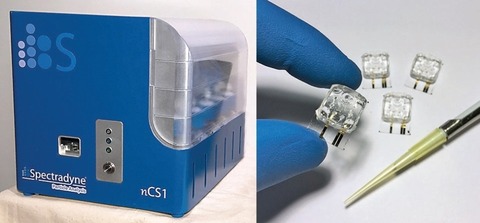
Spectradyne’s nCS1TM nanoparticle analyser, designed to detect and measure every particle in solution, has been launched into the UK by Meritics
Using Microfluidic Resistive Pulse Sensing (MRPS) – whereby electrical sensing measures the diameter of each particle as it passes through a nanoconstriction – the instrument requires only three microlitres of a sample to provide real-time sizing and concentration information.
Particles in the 35 – 10,000 nm diameter range are accurately counted - with a concentration range of approximately 104 — 1012 particles/mL. The nCS1 analyses nanoparticles of any material type (transparent, opaque, conducting, insulating).
It measures individual nanoparticles and rapidly accumulates statistically-reliable distributions of particle sizes with quantitative concentration information. Sizing precision of ± 5% is typically achieved, with measurement rates up to 10,000 particles/s.
Brian Miller, Founding Managing Director at Meritics, said: “The method used by the Spectradyne nCS1TM to measure nanoparticles is electrical in nature, so does not rely on an optical index contrast to distinguish particles from their suspending medium. Therefore, biological particles that have an index of refraction similar to their suspension medium can be detected much more easily with the nCS1TM than with other light-scattering based techniques. The technique is ideal for quantifying biological nanoparticles such as extracellular vesicles and virus.
“Furthermore, because particles are measured individually, accurate size distributions of samples with a wide range of diameters can be obtained. This capability is particularly important in the field of nanomedicine where the concentration and size distribution of drug-carrying nanoparticles give critical information about the bioavailability of the drug, and the immunogenicity and stability of the formulation.”
See Meritics in the UK for more information.





